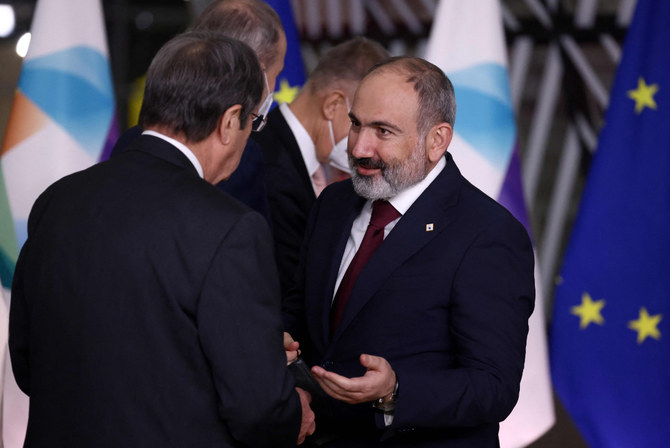Easing tensions in the South Caucusus

https://arab.news/9wfnj
European Council Chairman Charles Michel invited Azerbaijani President Ilham Aliyev and Armenian Prime Minister Nikol Pashinyan to a meeting on the sidelines of the EU Eastern Partnership summit held last week in Brussels.
Another trilateral summit scheduled before Nov. 10 — the first anniversary of the Nagorno-Karabakh ceasefire agreement — between Russian President Vladimir Putin, and Aliyev and Pashinyan, failed to materialize.
While preparations were underway for the Brussels meeting, Putin on Nov. 26 hastily invited the Armenian and Azerbaijani leaders for a trilateral summit in Sochi in order to maintain his influence on the Azeri-Armenian issue.
A comprehensive answer to the Azeri-Armenian question may be some way off. While the Brussels meeting was not expected to solve all pending issues, it did make concrete progress, and the declared commitments of Aliyev and Pashinyan to solve the dispute is one of the most important outcomes.
Another important achievement is the establishment of a direct communication link between the ministers of defense of Azerbaijan and Armenia, facilitated by Michel. However, the results of this remain to be seen.
The third outcome is an agreement on the difficult question of reactivating transport infrastructure that has fallen into disuse over decades in the Caucusus region known as the Zangezur corridor, previously a link between the two Soviet republics of Azerbaijan and Armenia.
Putin has unsuccessfully tried to persuade Pashinyan to reactivate this transport corridor. Where he has failed, the EU turned out to be more successful. The latter may have offered more attractive enticements to encourage the Armenian leader to agree. The EU has huge funds allocated to the promotion of an eastern partnership. More than €2.3 billion ($2.6 billion) is already put aside for a regional economic investment plan, but another longer-term scheme is estimated to leverage €17 billion in public and private investments.
These funds will be divided between six former Soviet bloc countries — Armenia, Azerbaijan, Belarus, Georgia, Moldova and Ukraine — but Armenia may get a disproportionately bigger share for several reasons: It has lost a war and needs rehabilitation, it has a strong diaspora in EU nations, and its per capita income is the lowest among the eastern partnership countries.
The deal brokered by the EU faces two risks: One is that it may fall victim to EU and Russian rivalry, with both Putin and Michel trying to be the main broker. The other rivalry is perhaps more sensitive, because it is between the Armenian President Armen Sarkissian and Pashinyan.
Yaşar Yakış
Azerbaijan is an oil-rich country, but what it needs is more administrative support. In fact, it volunteered to cover the cost of reactivating the Zangezur railroad, a project that upgrade the already existing network. The reason Azerbaijan is willing to take on the financial burden is that, after all, it is going to link its own territory to one of its provinces.
The EU promised an expert mission to support the border demarcation in the contested areas between Azerbaijan and Armenia. However, Russia would not like to be sidelined on this important issue, because the contested borders are in an area that Moscow still considers its own backyard and there is more background information on this subject in the Russian archives.
The easing of tensions between Azerbaijan and Armenia has affected Turkish-Armenian relations as well. Turkish Foreign Minister Mevlut Cavusoglu announced that the two countries have agreed to resume commercial flights that were suspended for decades. An attempt in 2009 to open the border crossing between the two countries failed because of Azerbaijan’s opposition.
Cavusoglu said that this time every step would be made in consultation with Azerbaijan to avoid any objection. Turkey designated Serdar Turgut, the former Turkish envoy to Washington, to oversee the negotiations. Armenia announced it also will designate a coordinator.
The deal on the rehabilitation of the transport infrastructure will also help Turkey to have direct access to Azerbaijan. It had direct access only to Nakhichevan, but not to Azerbaijan proper. The railroad, if and when rehabilitated, will become one of the axes of the Chinese Belt and Road initiative and will also link Turkey to the Central Asian Turkic republics.
This reticent beginning may lead at a later stage to the opening of the border between Turkey and Armenia, reviving the local economy and opening the door to other opportunities in the future.
However, the deal brokered by the EU faces two risks: One is that it may fall victim to EU and Russian rivalry, with both Putin and Michel trying to be the main broker.
The other rivalry is perhaps more sensitive, because it is between the Armenian President Armen Sarkissian and Pashinyan. Both want to be the main actor and there are nuances between their approaches. So the relaxation of the tension between Azerbaijan and Armenia may also fall victim to an internal rivalry within Armenia.
• Yasar Yakis is a former foreign minister of Turkey and founding member of the ruling AK Party. Twitter: @yakis_yasar









































